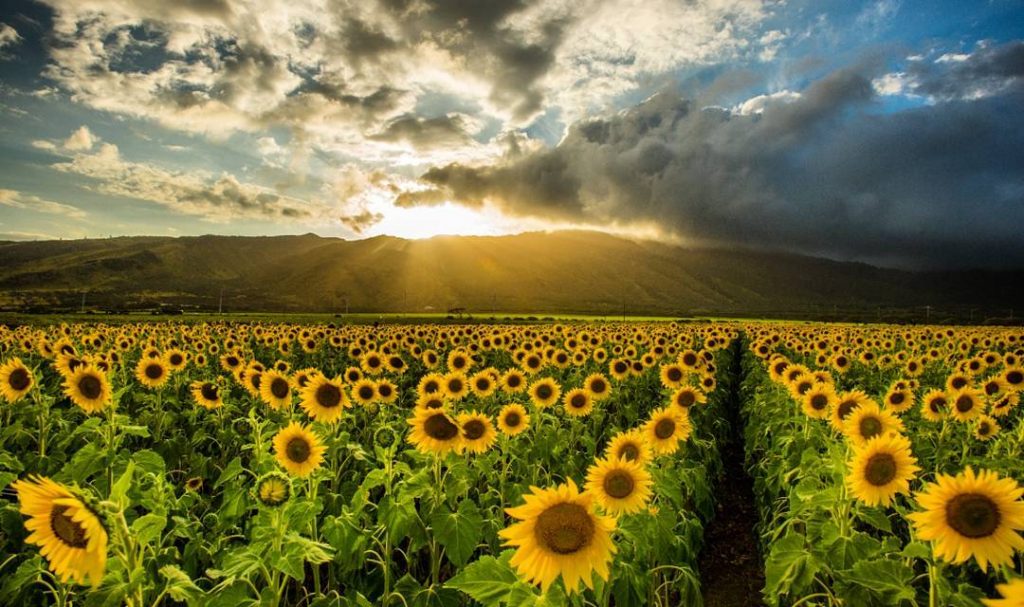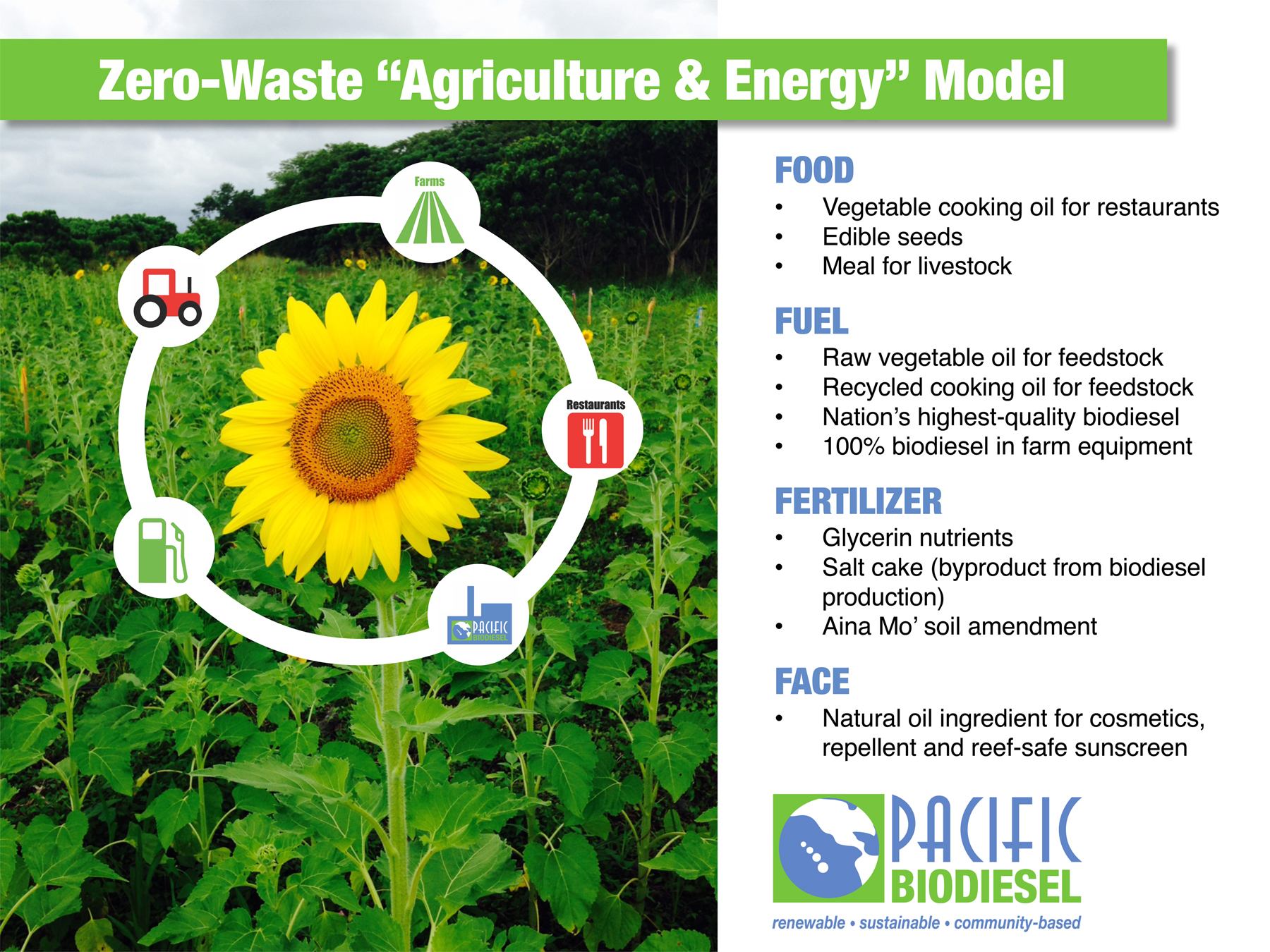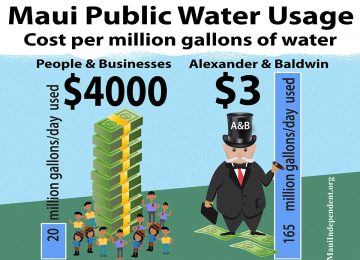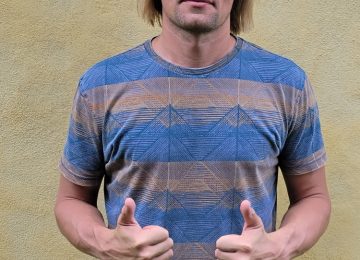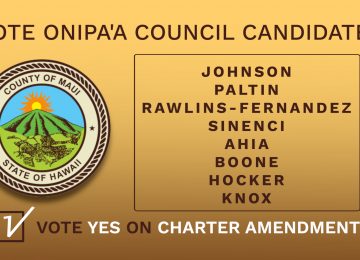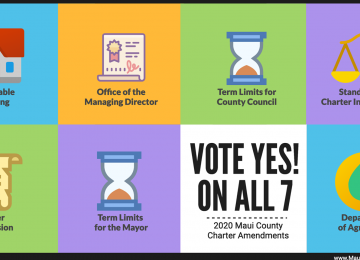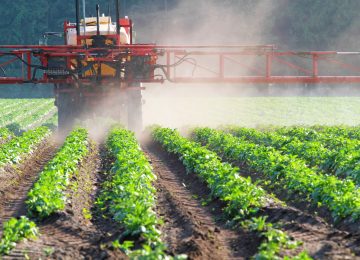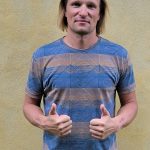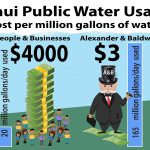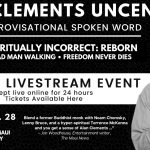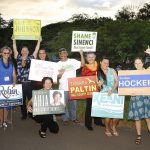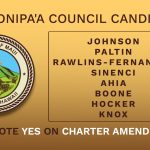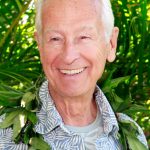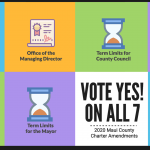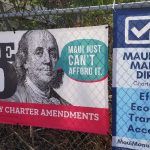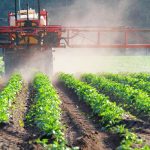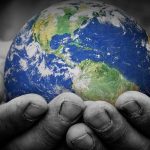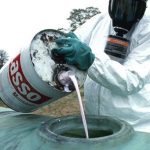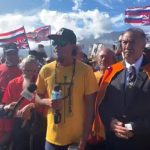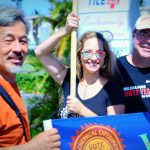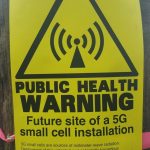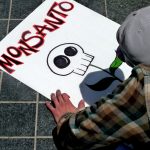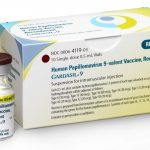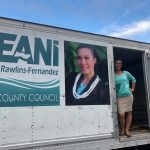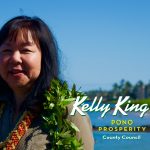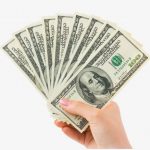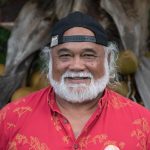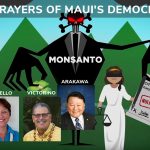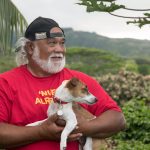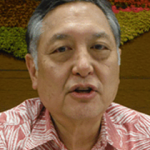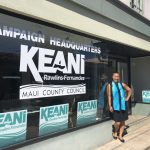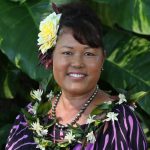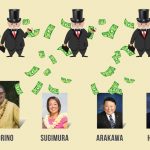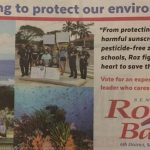With the death of the sugar cane plantation system, a pioneering local company is banking on a sea of golden yellow sunflowers to help revolutionize agricultural and energy production on Maui.
On 115-acres of former sugar cane land in central Maui between Waikapu and Maalaea, Pacific Biodiesel is harvesting its first batch of biofuel sunflowers as a demonstration project. The sunflower farm employs a large-scale, ecologically sustainable, herbicide-free, zero waste model that can revolutionize both agricultural and energy production systems on the island.
“My vision for central Maui is cover it with sunflowers,” says Pacific Biodiesel co-founder Kelly King, whose grassroots campaign won her a seat on Maui’s County Council last November. “We want to show it’s economically feasible to have a commercial operation with 10 to 15,000 acres of land.”
Founded in 1995, Maui-based Pacific Biodiesel is the nation’s longest-operating biodiesel producer. It pioneered the recycling of waste cooking oil into biodiesel, and went on to the build the first commercially viable small-scale biodiesel plant in the U.S. Now the innovative company, which employs more than 80 workers, is looking to change Maui’s landscape and potentially cover thousands of acres of abandoned sugar plantation land with dazzling blooms of sunflowers.
“It was very emotional when the first flower bloomed,” Kelly King continues. “The first crop was a real miracle, how much happiness and hope it gave everybody. It was like standing in the middle of 400,000 happy faces.”
When they first began championing biofuel crops in Hawaii the Kings encountered, “a lot of push back from academia and people in the energy industry. They would laugh and scoff. It will never happen. We’re in the research mode, but at some point if we can prove this model is economically feasible then we can get investment and move into the thousands of acres and it will have a return.”
“We’re designing a sustainable, zero-waste and economically viable system to grow food, animal feed and fuel,” explains Kelly’s husband, Pacific Biodiesel co-founder Bob King.
Actively researching and using alternatives to chemical fertilizer/pesticides, including compost to replace fertilizer and crop rotation to reduce pests, so far the sunflower crop has needed no irrigation.
“We will during hot summer months, but these crops are not water intensive,” Bob King explains.
“We have used no herbicides or pesticides, and we don’t plan to ever use them.”
Native to North America, sunflowers are an ideal addition to the potential mix of a sustainable, eco-friendly future for Maui’s agriculture. They have one of the higher percentages of oil content (considerably more than soybeans), with average yields producing 100 plus gallons of oil per acre per harvest, and up to three harvests per year possible on Maui.
“It’s such a beautiful plant and I knew it would bring a measure of eco-tourism to the island,” says Kelly King. “It’s something people can get behind because there are no GMO sunflowers.”
The sunflower farm proved to be a enormous tourist attraction, with visitors and residents flocking to delight in the sunny spring scene. Now with harvest time immanent the company has just purchased a combine harvester from the mainland and is about to process its first energy crop.
For many decades, sugar cane, a federally subsidized crop with zero nutritious value, dominated Hawaii’s agriculture. Beginning in 1913 and lasting until the start of World War II, sodium arsenate (a toxic carcinogen) was employed as an herbicide in the state. Roger Humbert’s book “The Growth of Sugar Cane” describes how various herbicides were sprayed in the islands, with the development of 2,4-D (an endocrine disruptor and possible carcinogen) effective for weed control. Since 1952, CMU and DCMU (Diuron) were principally used, along with Dalapon, TCA, arsenic trioxide and Simazine. Soil sterilization was also an important phase of weed control, with boron in toxic qualities rendering soil sterile.
In sharp contrast to the soil damaging chemical pollution of the former sugar plantation land upon which Pacific Biodiesel’s sunflowers grow, the new crop has an intriguing role in soil health. Sunflowers are hyperaccumulators – which means they have the ability to take up high concentrations of toxic materials in their tissues. After the Fukushima and Chernobyl nuclear disasters, fields of sunflowers were planted across the affected landscapes to help absorb toxic metals and radiation from the soil.
The process of phytoremediation is a cost-effective and environmentally-friendly way to reclaim and reuse land that has been tainted by poisonous chemicals and heavy metals. A New York Times article described how sunflowers were being planted in contaminated land zones because they were known collectors of lead.
“People were predicting that it would take five years to rehabilitate the sugar cane land before we could do anything on it,” Kelly King notes. “This shows that’s not necessarily the case because we’ve turned it over pretty quickly, and we just used rain water on the first crop.”
Along with sunflowers Pacific Biodiesel is planning to grow safflowers in the fall. “Safflower doesn’t like water,” Bob King says. “If you give it much water it will get out-competed by weeds. It’s happy if it’s dry.”
“The great thing is all the types of plants we’re looking at take 25 percent or less water than it took to grow sugar cane,” adds Kelly King. “It’s a great model because they are 100 day crops. We won’t be mono cropping and we’ll be flexible especially as we grow up to the level of thousands of acres.”
Pacific Biodiesel’s innovative project serves as a sound ecological model as to how former sugar cane land could be utilized.
As the owner of more than 32,000 acres of former sugar plantation land spread across the island, Alexander & Baldwin is seeking business partners to lease land to. As reported in The Maui Independent, the corporation is also attempting to renew leases for the delivery of 115 million gallons of water a day at an outrageously discounted price. The arid land, made valuable by a no-strings attached water lease, could be subleased to major agribusiness corporations, with some sold off by A&B as developments with multi-million dollar estates.
A&B is currently in discussions with one mainland-based company, TerViva, to potentially grow pongamia trees on former sugar cane land as a biodiesel crop. Native to India there are a number of issues that could limit pongamia’s usefulness. Time to reach reproductive maturity averages five to seven years, the trees leaves and seeds are toxic to herbivores, and it can escape cultivation and naturalize outside its native range.
“Maybe it has potential,” Philip New, head of BP Biofuels, told Reuters. “We looked at jatropha but backed away as we couldn’t work out how it would work at scale. Similarly, this is best suited to a small holder environment as a cash crop.”
“We could get a lot of crops in three to five years, whereas if you grow trees you need to sequester that land for thirty years,” explains Kelly King. “We can get a return so much faster than tree crops. Tree crops take a long time to mature and not many local farmers can sit on a crop for five to seven years watering and fertilizing before it starts producing and waiting for your first return. We tried a jatropha crop on the Big Island, but it’s a little unpredictable as far as the harvest.”
They are also looking at hemp.
“We’re chomping at the bit to get that in the ground,” says Bob King. “We’ve got the equipment to do it. We’ve just got to get the State to give us a permit.”
“It’s definitely feasible, the State is still working on the permit process,” says Kelly King.
So why biodiesel?
Biodiesel is environmental friendly and ideal for heavily polluted cities. It produces less carbon dioxide and less sulfur dioxide emissions than petroleum diesel, and it extends the life of diesel engines.
Biodiesel fuel was first developed by Rudolf Diesel, the inventor of the diesel engine. At the Paris World Fair in 1900, he demonstrated a model running on peanut oil. In his honor, National Biodiesel Day is celebrated on his birthday, March 18.
Biodiesel can be used in cars, buses, trucks, farm equipment, and in power stations. In 2010, Hawaiian Electric opened the Campbell Industrial Park Generating Station, which is believed to be the largest commercial generator fueled exclusively with sustainable biodiesel.
“The Public Utilities Commission and Hawaiian Electric have been very steady with their use of biodiesel,” Bob King reports. “The Campbell plant works great, but they’ve lobbied the PUC to go back to fossil fuel and take the biodiesel and use it in the new plant at Schofield (Barracks).”
Maui’s Maalaea Power Plant, which relies primarily on petroleum diesel for fuel, uses some biodiesel. “It’s used right now as an emission control agent for the big Mitsubishi diesels,” he explains. “Every time they start or stop, they run them on 100% biodiesel.”
The Maalaea plant uses roughly 50 to 60,000 gallons of petroleum diesel fuel a year, which is currently beyond the reach of Pacific Biodiesel’s output.
With Maui serving as an important hub for biodiesel development one would assume our County Council would be bending over backwards to offer encouragement. But not so far. “I’ve had some council members express incredulous surprise to learn that the County administration isn’t using any biodiesel,” says Kelly King. “It should be in all the buses and all their diesel vehicles. They’ve been resistant to using it.”
To create biodiesel, the Maui company will harvest their crops and extract oil from the seeds. “We’ll get the sunflower, hemp or safflower seeds and put them through a non-chemical process to crush the oil out,” Kelly King explains. “What we have left over is a high value meal that could be used as livestock feed and for human consumption. People eat hemp and sunflower seeds and products. We’re focused on the food and fuel models.”
Pacific Biodiesel was conceived in 1995 in response to environmental and health concerns caused by unmanageable quantities of used cooking oil from the island’s many restaurants and hotels, which ended up in the Central Maui Landfill. Bob King, then owner of King Diesel that maintained the landfill’s generators, proposed recycling the restaurant waste into biodiesel that would fuel the generators. Since opening and operating the very first retail biodiesel pump in America, the company has evolved into a leading pioneer in the rapidly expanding biodiesel industry.
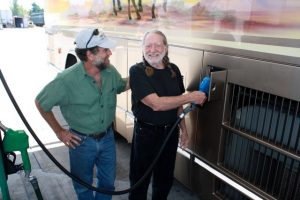
Bob King with country legend Willie Nelson pumping biodiesel into Willie’s tour bus.
“It wasn’t until much later we realized how really early we were in the industry,” Bob King marvels. “Reading the literature we thought more people were doing it, so we just jumped in. You can’t just talk about things, you need to do it.”
Since its inception Pacific Biodiesel has built 12 facilities on the mainland and one in Japan. Country star Willie Nelson and his wife, Annie Nelson, are major supporters of the King’s efforts. The Nelsons drive biodiesel vehicles, including Willie’s tour bus, and are partners in Pacific’s plants in Salem, Oregon and on Hawaii Island. They are also founding members in the nonprofit Sustainable Biodiesel Alliance with the Kings. BioWillie brand biodiesel is sold on Maui at a station in Kahului.
“There is really no need going around starting wars over oil,” Willie Nelson said in a 2005 Associated Press interview. “We have the necessary product, the farmers can grow it.”
The company’s latest venture, Big Island Biodiesel, which features zero-waste processing, produces the highest quality biodiesel available in the nation.
“We feel proud,” Kelly King concludes. “At various times we’ve leveraged everything we own. We’ve had times when we didn’t know if we would be living in our house the next month because it could have all come crashing down and we would have lost everything. But we believed in it so much it was worth it. Because neither one of us is that materialistic if we crashed and burned we’d have just started over again. If you don’t have the fear and attachment to the material things in your life you can do a lot.”



